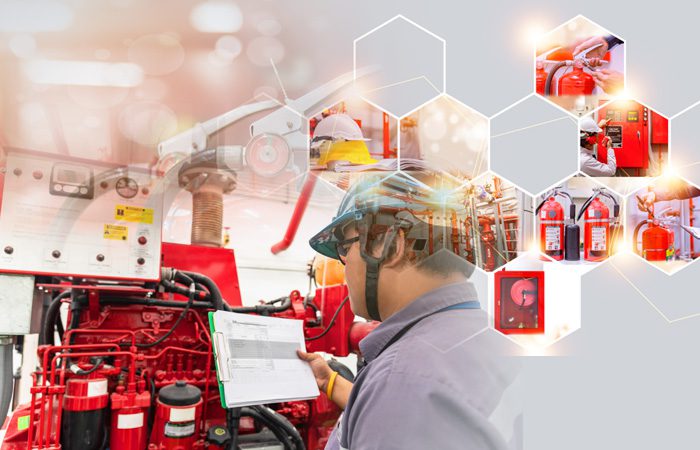
Fire Protection Engineering: Innovations in Fire Suppression and Detection Systems
Fire safety engineering is a crucial aspect of building design and construction that ensures occupant safety as well as protection of property. Cutting-edge fire suppression and detection systems have greatly improved our ability to prevent, detect, and fight fires leading to a decrease in the risk of devastating damage or loss of lives.
This blog post highlights the recent achievements in fire defense technology and emphasizes the importance of an effective engineering consultant to implement such developments.
- Advanced Fire Detection Systems
Smart Smoke Detectors
While conventional smoke alarm systems are necessary, they are not very accurate or reliable. On the other hand, smart smoke detectors have more precise sensing mechanisms and can spot early signs of danger. They do not get confused by cooking smells like other normal ones do thus minimizing false alerts. Moreover, these types of detectors are engineered with provision for alerting users through mobile phones hence facilitating remote monitoring.
Multi-Sensor Detectors
Multi-sensor detectors incorporate several sensors for evaluating possible fire-related risks comprising smoke, heat and carbon monoxide detection. By considering multiple variables at once, these devices provide better accuracy and faster response. They are particularly useful in environments with varying conditions that might affect detection performance.
Aspirating Smoke Detection Systems
Aspirating smoke detection (ASD) systems are highly sensitive and capable of detecting smoke at an early stage. These systems continuously draw air samples from the protected area through a network of pipes and analyze them for smoke particles. ASD systems are ideal for critical applications such as data centers, museums, and cleanrooms, where early detection is crucial to prevent extensive damage.
- Innovative Fire Suppression Systems
Water Mist Systems
Water mist systems utilize fine water droplets to suppress fires effectively. The small droplet size increases the surface area, enhancing cooling and oxygen displacement while using significantly less water than traditional sprinkler systems. Water mist systems are particularly suitable for environments where water damage must be minimized, such as data centers, archives, and hospitals.
Clean Agent Fire Suppression
Clean agent fire suppression systems use environmentally friendly gases, such as FM-200 or Novec 1230, to extinguish fires without leaving residue or harming sensitive equipment. These systems are ideal for areas with valuable electronics, such as server rooms and control centers. The clean agents quickly suppress the fire by interrupting the chemical reaction of combustion, providing rapid and effective protection.
Hybrid Suppression Systems
Hybrid suppression systems combine different suppression technologies to provide comprehensive fire protection. For example, a hybrid system might use water mist for general fire suppression and clean agents for protecting sensitive equipment. By leveraging the strengths of multiple technologies, hybrid systems offer tailored solutions for complex fire protection challenges.
- Enhanced Fire Protection Strategies
Integrated Fire Protection Systems
Integration of fire detection and suppression systems with building management systems (BMS) enhances overall fire protection. An integrated approach allows for centralized monitoring, automated responses, and coordinated evacuation procedures. For instance, upon detecting a fire, the system can automatically shut down HVAC systems to prevent the spread of smoke and unlock exit doors for safe evacuation.
Performance-Based Design
Performance-based design (PBD) is an approach that focuses on achieving specific fire safety objectives rather than adhering strictly to prescriptive codes. PBD allows engineers to use advanced modeling and simulation tools to predict fire behavior and assess the effectiveness of various fire protection strategies. This approach enables customized solutions tailored to the unique needs and risks of each building.
Wireless Fire Detection Systems
Wireless fire detection systems offer flexibility and ease of installation, particularly in retrofitting existing buildings. These systems use wireless communication to connect detectors and control panels, eliminating the need for extensive wiring. Wireless systems can be quickly deployed, reducing installation time and costs while maintaining reliable fire detection capabilities.
The Role of a Reliable Engineering Consultant
Implementing advanced fire suppression and detection systems requires the expertise of a reliable engineering consultant. Here are key reasons why partnering with an experienced consultant is crucial:
- Expertise in Fire Protection Design
Engineering consultants specializing in fire protection have in-depth knowledge of the latest technologies, codes, and standards. They can design and implement systems that meet regulatory requirements while ensuring optimal performance. Their expertise ensures that the fire protection systems are tailored to the specific needs and risks of the building.
- Customized Solutions
Every building has unique fire protection needs based on its design, occupancy, and use. A reliable engineering consultant conducts thorough risk assessments and develops customized solutions that address the specific challenges of the building. This tailored approach ensures comprehensive fire protection and minimizes potential vulnerabilities.
- Seamless Integration
Integrating fire protection systems with other building systems, such as HVAC and security, requires careful planning and coordination. Engineering consultants have the experience to ensure seamless integration, enabling efficient and automated responses in the event of a fire. This holistic approach enhances overall building safety and performance.
- Project Management
Implementing advanced fire protection systems involves multiple stakeholders, including contractors, equipment suppliers, and regulatory authorities. An experienced engineering consultant manages the entire project, from design and procurement to installation and commissioning. Their oversight ensures that the project is completed on time, within budget, and to the highest standards.
- Ongoing Support and Maintenance
Fire protection systems require regular maintenance and testing to ensure they remain effective. A reliable engineering consultant provides ongoing support, including routine inspections, system upgrades, and emergency response planning. This proactive approach helps maintain the integrity of the fire protection systems and ensures compliance with evolving regulations.
Innovations in fire suppression and detection systems are revolutionizing fire protection engineering, providing enhanced safety and peace of mind for building occupants. From smart smoke detectors to clean agent suppression systems, these advancements offer more accurate, efficient, and environmentally friendly solutions for fire protection. However, the successful implementation of these technologies depends on the expertise of a reliable engineering consultant. Their knowledge, experience, and commitment to excellence are essential in designing, installing, and maintaining advanced fire protection systems that safeguard lives and property.
Partnering with a trusted engineering consultant ensures that buildings are equipped with state-of-the-art fire protection systems tailored to their unique needs, providing comprehensive and reliable fire safety solutions.

